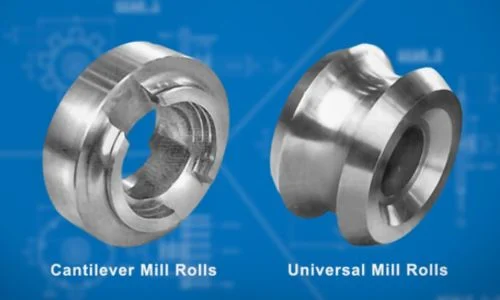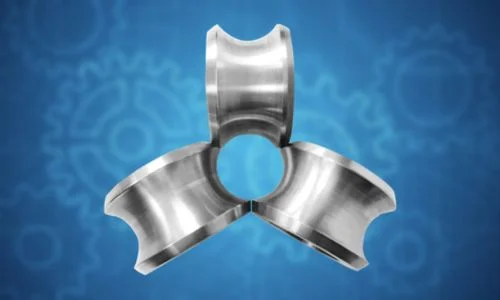Deem Roll Tech Limited Products Lists: Deem Roll Tech Ltd started in 2003 to make strong and special rolls from steel and alloy. Deem Roll Tech Limited is a company that makes strong and top-quality steel and alloy rolls.
These rolls are used in the iron and steel rolling mill industry, both in India and around the world. The company sells its rolls to rolling mill manufacturers and steel mills through distributors and agents.
Here are some Deem Roll Tech Limited Products Lists they make like Double Pour Indefinite Chilled Rolls, Tungsten carbide rolls, Tube mill rolls, etc.
Deem Roll Tech Limited IPO is all set to open on 20th February 2024. The company is engaged in the business of making high-quality steel and alloy Rolls. The IPO includes a fresh issue of 2,268,000 shares worth ₹29.26 cr.
Deem Roll Tech Limited Products Lists
If you are searching for “Deem Roll Tech Limited Products Lists” then this post is interesting for you in this post we cover the List of products Deem Roll manufactures and sells all over the world. so here is the list of products below:


1. Spheroidal Graphite( Nodular)Cast Iron
2. Indefinite Chill Alloy Cast Iron
3. Alloy steel Base
4. Graphitic steel rolls
5. Double Poured Alloy Indefinite Chill
6. High-Speed Steel
7. Tungsten Carbide Rolls
8. Tube Mill Rolls
Deem Roll Tech Limited Products Lists Summary
Deem Roll Tech Limited is engaged in the business of making high-quality steel and alloy Rolls used in iron and steel rolling. so here are Deem Roll Tech Limited Products Lists Summary, Application, uses & working below:
Spheroidal Graphite( Nodular)Cast Iron
Spheroidal Graphite Cast Iron, also known as Nodular Cast Iron, is a type of iron that contains graphite in the form of small, spherical nodules or spheroids.
This graphite structure gives the iron enhanced properties compared to traditional cast iron.
The nodular shape of graphite in this type of iron provides greater flexibility and strength, making it more ductile and impact-resistant. This improved ductility makes it less prone to cracking, enhancing its performance in various applications.
Spheroidal Graphite Cast Iron is commonly used in engineering and manufacturing applications where a combination of strength, toughness, and machinability is required.
Its properties make it suitable for components subjected to dynamic loads, such as gears, crankshafts, and other mechanical parts.
Application of Spheroidal Graphite( Nodular)Cast Iron
1. Automotive Industry:
- Engine components: Cylinder blocks, cylinder heads, crankshafts, camshafts, and other parts of internal combustion engines benefit from the excellent strength and wear resistance of nodular cast iron.
- Brake components: Disc brake rotors and calipers can be made from nodular cast iron due to their good heat dissipation and wear resistance.
2. Construction and Infrastructure:
- Pipe and fittings: Ductile iron pipes are commonly used for water and wastewater systems due to their durability and corrosion resistance.
- Manhole covers and frames: Nodular cast iron’s strength and impact resistance make it suitable for heavy-duty applications in construction.
Indefinite Chill Alloy Cast Iron
Indefinite Chill Alloy Cast Iron is a type of cast iron specially treated to enhance its surface hardness and wear resistance.
In the manufacturing process, the surface of the iron is subjected to a controlled chilling process, which involves rapid cooling to create a hardened outer layer.
This hardened layer often referred to as “indefinite chill,” is composed of a combination of alloy elements.
These alloys contribute to the improved hardness and wear resistance of the cast iron, making it suitable for applications where the material is subjected to abrasive wear and friction.
Indefinite Chill Alloy Cast Iron is commonly used in various industrial applications, particularly in components like rolls for rolling mills, where durability and resistance to wear are crucial.
The alloy composition and the chilling process help create a robust and long-lasting material.
Application of Indefinite Chill Alloy Cast Iron:
Metal Tube and Pipe Mills:
- The material is employed in the production of rolls used in metal tube and pipe mills, where it can withstand the high stresses and abrasion associated with shaping and forming metal tubes.
Wire Rod Mills:
- Indefinite chill alloy cast iron is utilized in the manufacturing of rolls for wire rod mills, providing the necessary wear resistance and durability for continuous wire production.
Alloy steel Base
Alloy steel is a type of steel that contains additional elements, apart from carbon, to enhance its properties. The “base” in “alloy steel base” refers to the foundational composition of the alloy before any additional elements are added.
Alloy steel’s strength and performance characteristics are modified by introducing elements such as chromium, nickel, manganese, vanadium, and others.
These alloying elements contribute to specific improvements in properties like hardness, strength, corrosion resistance, and heat resistance.
The term “alloy steel base” signifies the starting point of the alloy, highlighting that it is a steel composition with the potential for enhanced qualities through the incorporation of various alloying elements.
Application of Alloy Steel Base:
Automotive Components
- Alloy steel is widely used in the automotive industry for the manufacturing of various components due to its excellent combination of strength, hardness, and wear resistance.
- Applications include producing critical parts such as gears, axles, crankshafts, camshafts, and bearings, where the material’s enhanced mechanical properties contribute to improved performance and durability.
Aerospace Structures and Components
- Alloy steel finds extensive use in the aerospace industry for its high strength-to-weight ratio and excellent mechanical properties.
- Components such as landing gear, structural elements, and fasteners in aircraft benefit from the superior strength, toughness, and corrosion resistance offered by alloy steel.
Graphitic steel rolls
Graphitic steel rolls are specialized components used in rolling mills, particularly in metalworking processes like steel and alloy rolling.
These rolls are designed with a specific type of graphite structure to enhance their performance in various industrial applications.
The term “graphitic” in graphitic steel rolls refers to the presence of graphite in the form of flakes or nodules within the microstructure of the steel.
This graphite structure imparts beneficial properties to the rolls, such as improved lubrication, better thermal conductivity, and resistance to thermal cracking.
Graphitic steel rolls are known for their ability to withstand high temperatures and heavy loads encountered in rolling processes.
Application of Graphitic steel rolls:
Bar Mills:
- Bar mills that produce steel bars utilize graphitic steel rolls for their durability and resistance to wear. The rolls play a key role in shaping and reducing the cross-sectional area of the bars.
Section Mills:
- Graphitic steel rolls find application in section mills, where they are used in the rolling of various steel sections, such as I-beams, channels, and angles.
ALSO READ: Indian Automotive Industry Growth Beats Japan on Vechile.
Double Poured Alloy Indefinite Chill
Double Poured Alloy Indefinite Chill” refers to a specialized type of cast iron used in the manufacturing of industrial components, particularly in applications like rolling mills.
Double Poured: The casting process involves pouring molten metal twice for a refined and controlled structure, enhancing consistency and achieving desired properties.
Alloy: Cast iron contains additional elements beyond iron and carbon, chosen for specific characteristics like improved strength, hardness, or wear resistance.
Indefinite Chill: Surface treatment involves rapid cooling, creating a hardened outer layer for increased durability and wear resistance, suitable for applications prone to abrasion and friction.
Application of Double-Poured Alloy Indefinite Chill:
Metal Forming and Shaping:
- Applications involving heavy-duty metal forming, such as forging and extrusion, benefit from the enhanced strength and wear resistance of Double poured alloy indefinite chill cast iron. The material can withstand the high pressures and temperatures associated with these processes.
Mining Equipment:
- Components in mining machinery, such as crusher parts and conveyor rollers, can utilize Double poured alloy indefinite chill cast iron for its toughness and wear resistance, ensuring longevity in harsh mining environments.
High-Speed Steel
High-speed steel (HSS) is a type of tool steel known for its exceptional ability to withstand high temperatures and maintain cutting tool hardness at elevated operating temperatures.
HSS is widely used in the manufacturing and machining industries for cutting, drilling, milling, and other metalworking processes.
HSS is known for its high hardness, allowing cutting tools made from this material to retain their sharpness even at elevated temperatures.
HSS can withstand high temperatures generated during metal cutting operations without losing its hardness. This property is crucial for tools that experience friction and heat during use.
High-speed steel is versatile and can be used for a wide range of cutting applications across various materials, including metals, plastics, and wood.
Application of High-Speed Steel:
Cutting Tools:
- Drill Bits: HSS drill bits are widely used for drilling holes in metals, wood, and other materials.
- End Mills: HSS end mills are employed for milling operations in machining centers.
- Reamers: HSS reamers are used for precision hole sizing and finishing.
Woodworking Tools:
- Planer Knives: HSS planer knives are used in woodworking machines for shaping and smoothing wooden surfaces.
- Saw Blades: HSS saw blades are employed for cutting various materials, including wood and non-ferrous metals.
Tungsten Carbide Rolls
Tungsten Carbide Rolls are specialized industrial components commonly used in rolling mills, particularly in the metalworking and wire drawing industries.
Tungsten Carbide Rolls are made from a composite material consisting primarily of tungsten carbide particles held together by a binder, often cobalt. Tungsten carbide is a hard and durable material known for its wear resistance.
Tungsten carbide is one of the hardest materials available, and as a result, rolls made from this material exhibit exceptional hardness.
Tungsten carbide retains its hardness even at elevated temperatures, allowing the rolls to maintain their cutting and shaping capabilities in high-temperature rolling applications.
Application of Tungsten Carbide Rolls:
Rolling Mills in the Metal Industry:
- Tungsten carbide rolls are extensively used in rolling mills for the production of long products such as wire, bars, and tubes. These rolls withstand high temperatures and pressures, providing excellent wear resistance and extended service life.
Wire and Rod Mills:
- Tungsten carbide rolls are commonly employed in wire and rod mills for drawing and reducing the diameter of metal wires and rods. The hardness of tungsten carbide ensures precision in shaping and maintaining consistent product dimensions.
Tube Mill Rolls
Tube Mill Rolls are crucial components used in tube and pipe manufacturing processes, specifically in tube mills. These rolls play a vital role in shaping and forming tubes from flat metal strips through a series of rolling operations.
Tube Mill Rolls are typically made from high-quality alloy steels or special tool steels.
The choice of material depends on the specific requirements of the tube manufacturing process, including considerations for durability, wear resistance, and thermal properties.
The rolls in a tube mill are designed with specific profiles to facilitate the shaping of the metal strip into a cylindrical form.
The design of the rolls is crucial in determining the final dimensions and characteristics of the tubes being produced.
Application of Tube Mill Rolls:
Tube and Pipe Manufacturing:
- Tube mill rolls are essential components in the manufacturing of tubes and pipes. They are used in various processes, including forming, welding, and sizing, contributing to the production of consistent and high-quality tubes.
ERW (Electric Resistance Welding) Mills:
- In ERW mills, tube mill rolls are utilized in the forming and welding processes. These rolls help shape the strip into a cylindrical form and contribute to the seamless welding of the edges to create a continuous tube.
Conclusion:
The article introduces Deem Roll Tech Limited Products Lists and a Diverse range, including steel and alloy rolls for various industrial applications. It emphasizes the upcoming IPO, offering insights into the company’s financial growth. The article provides a concise overview of Deem Roll Tech Limited’s products and market position.
